Charles E W Bean, Diaries, AWM38 3DRL 606/261/1 - 1929 - 1930 - Part 6
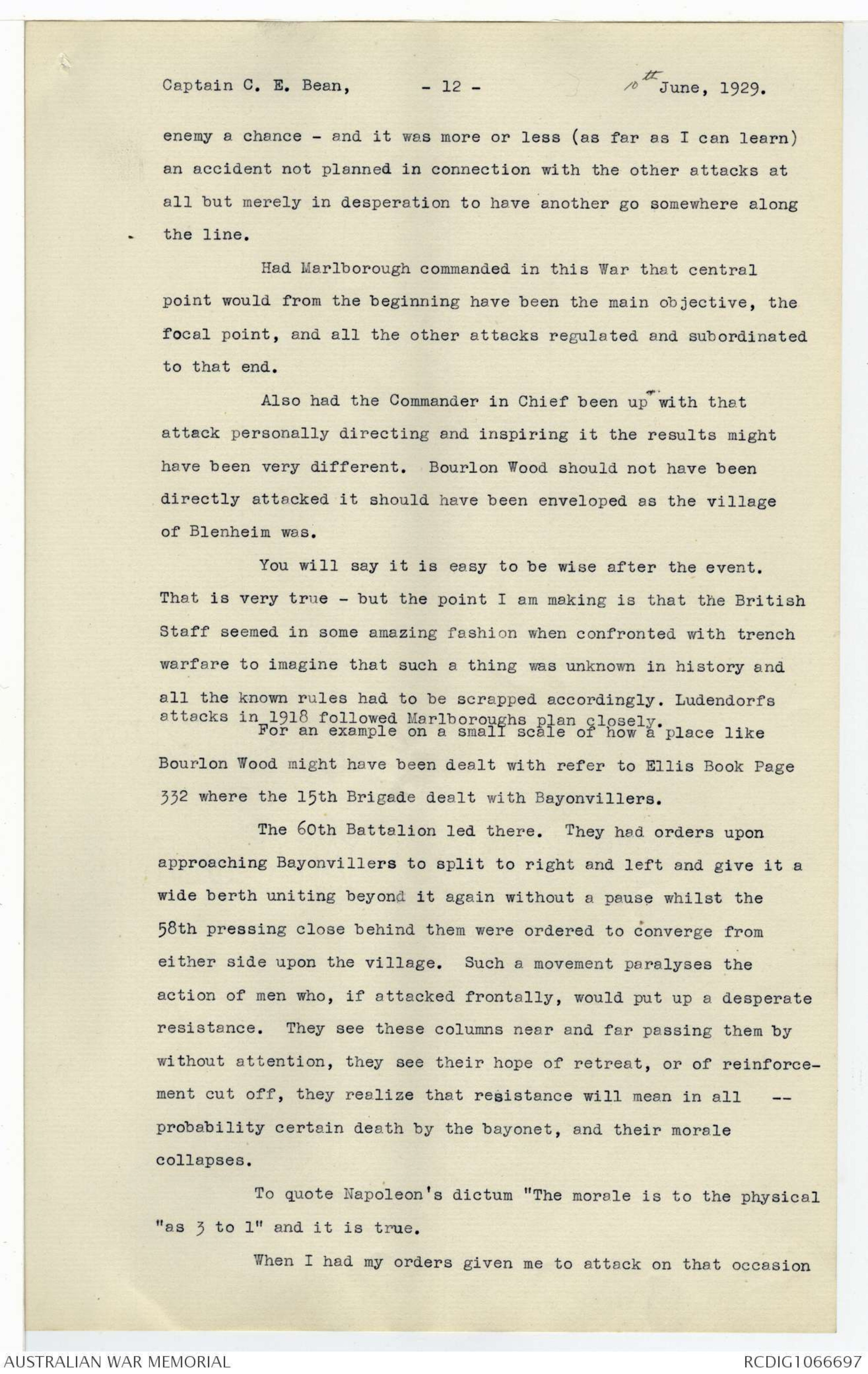
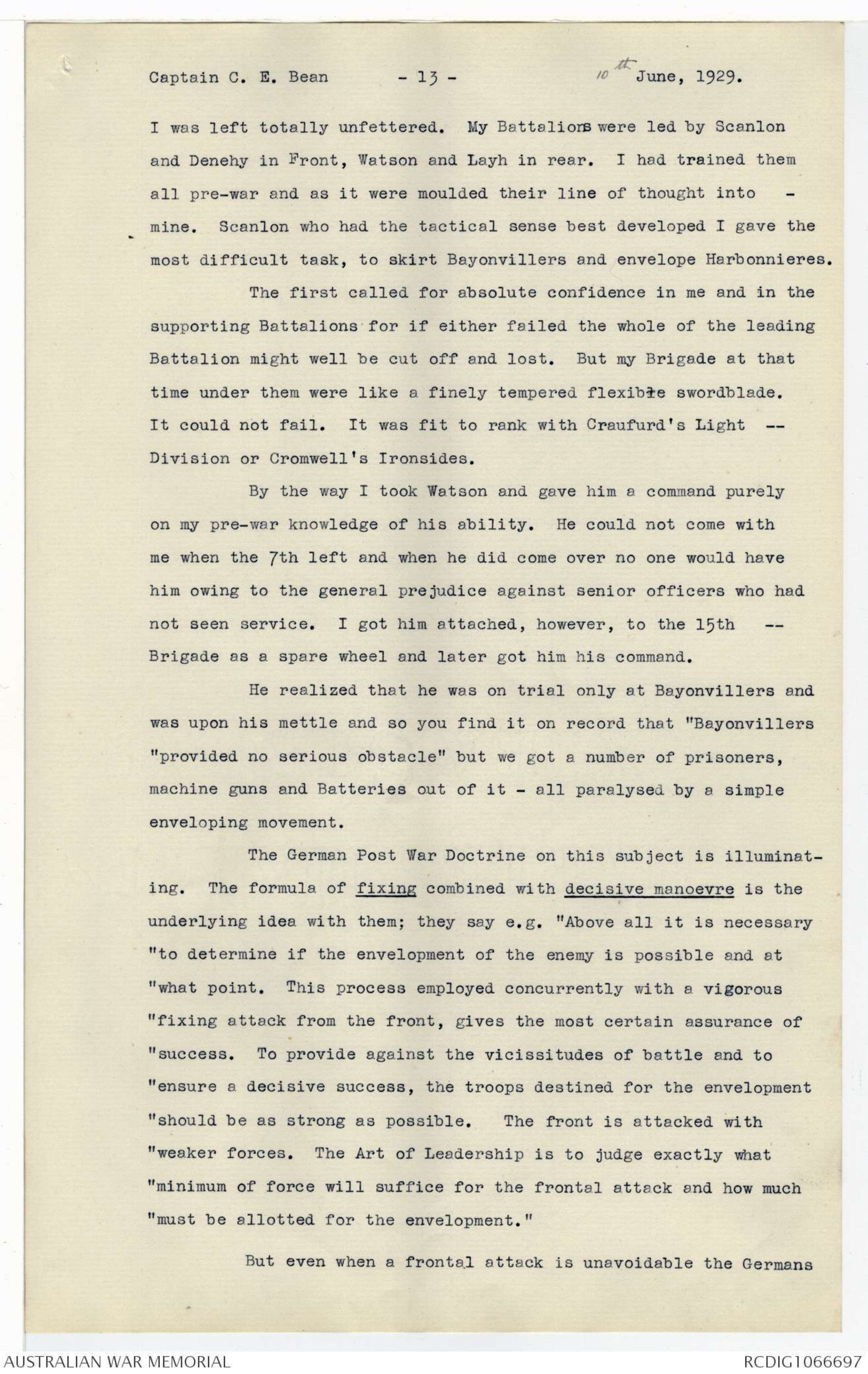
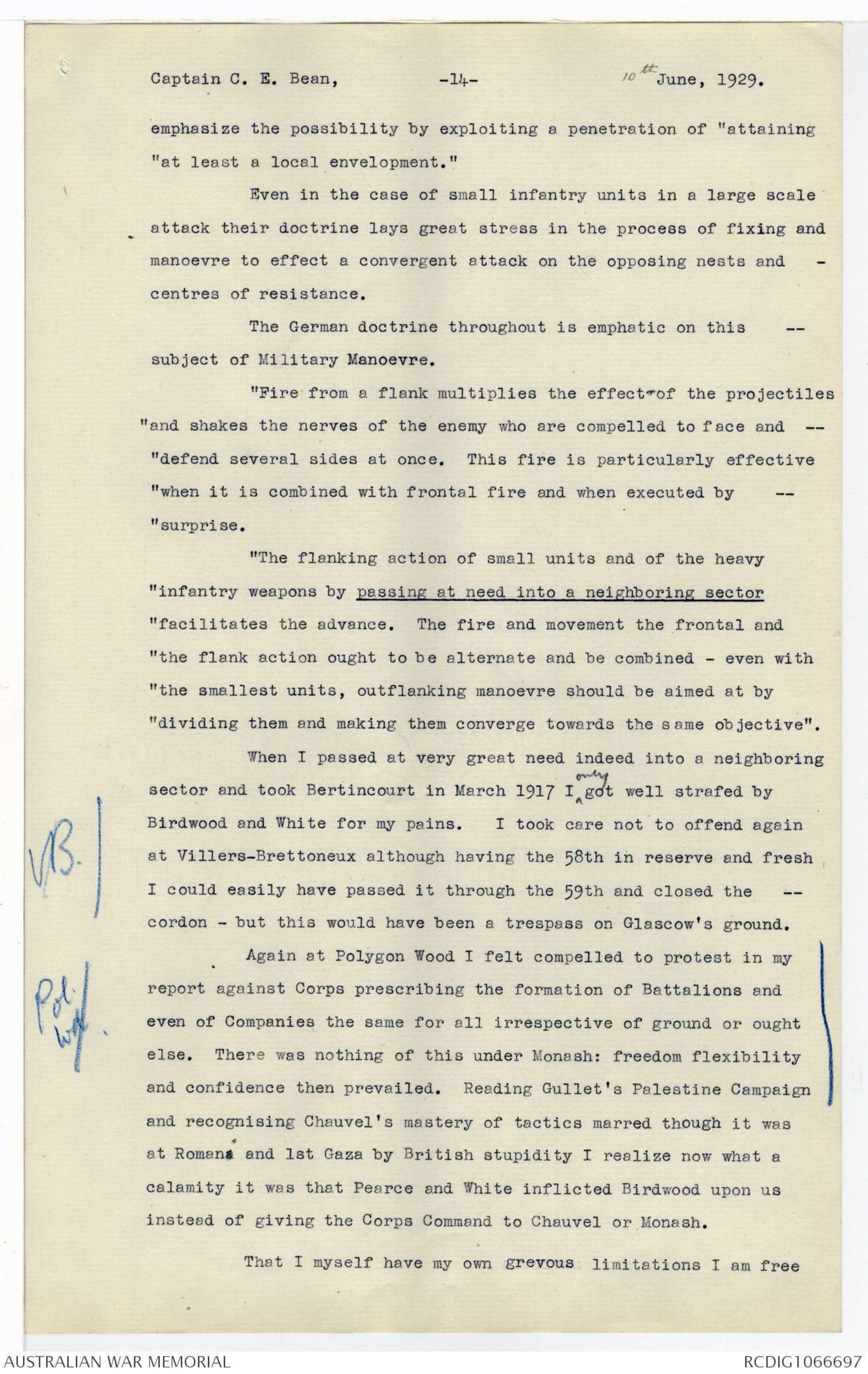
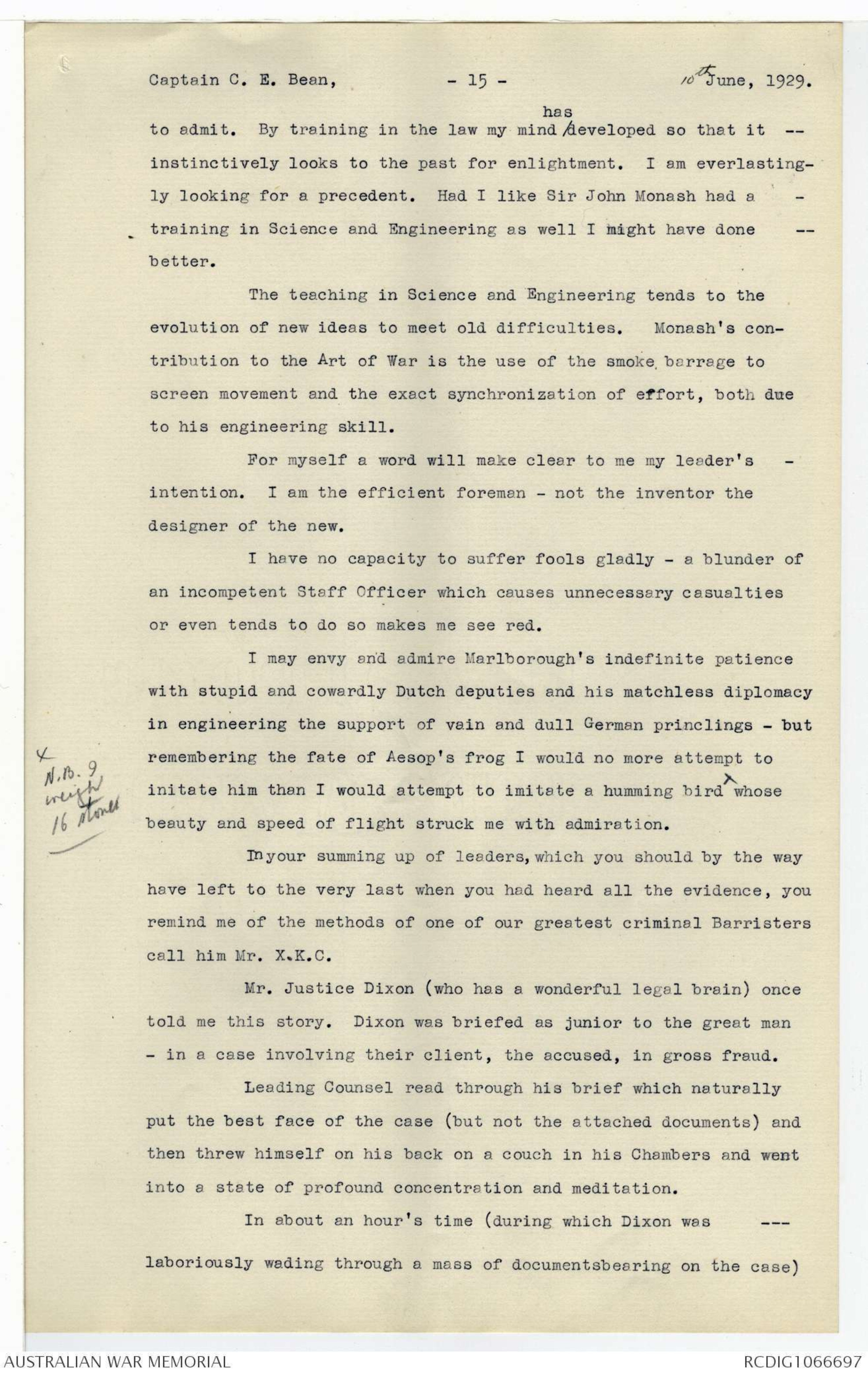
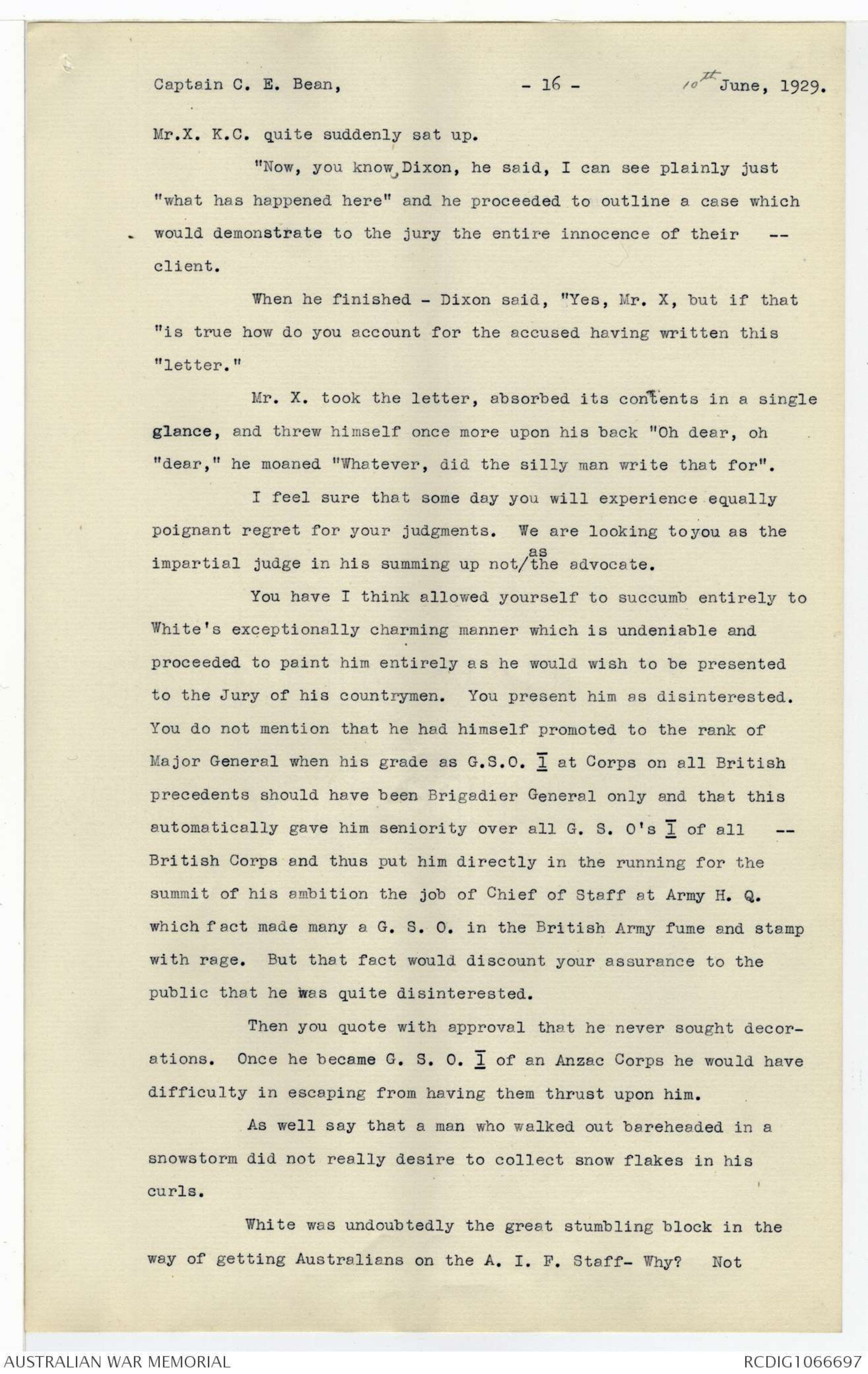
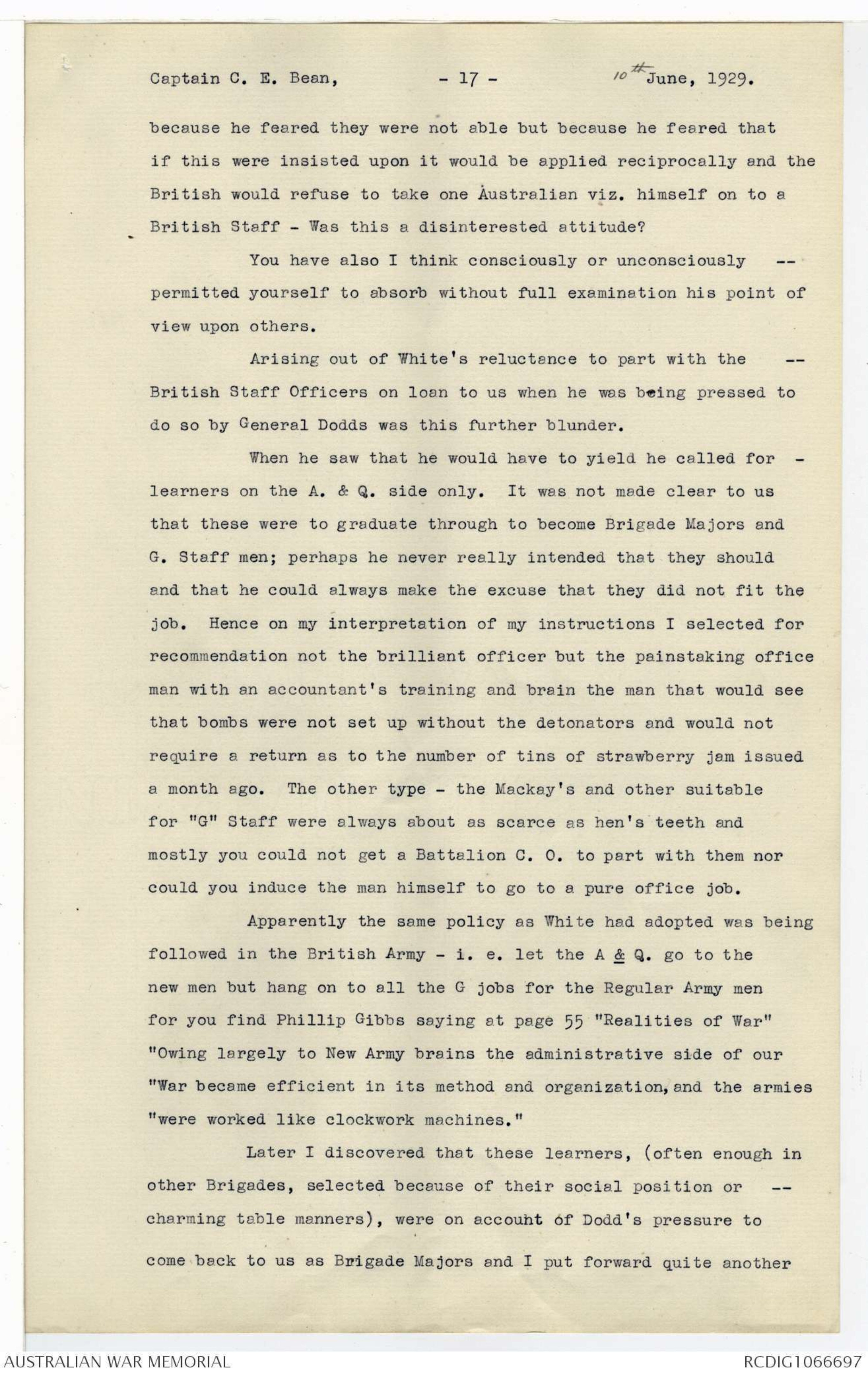
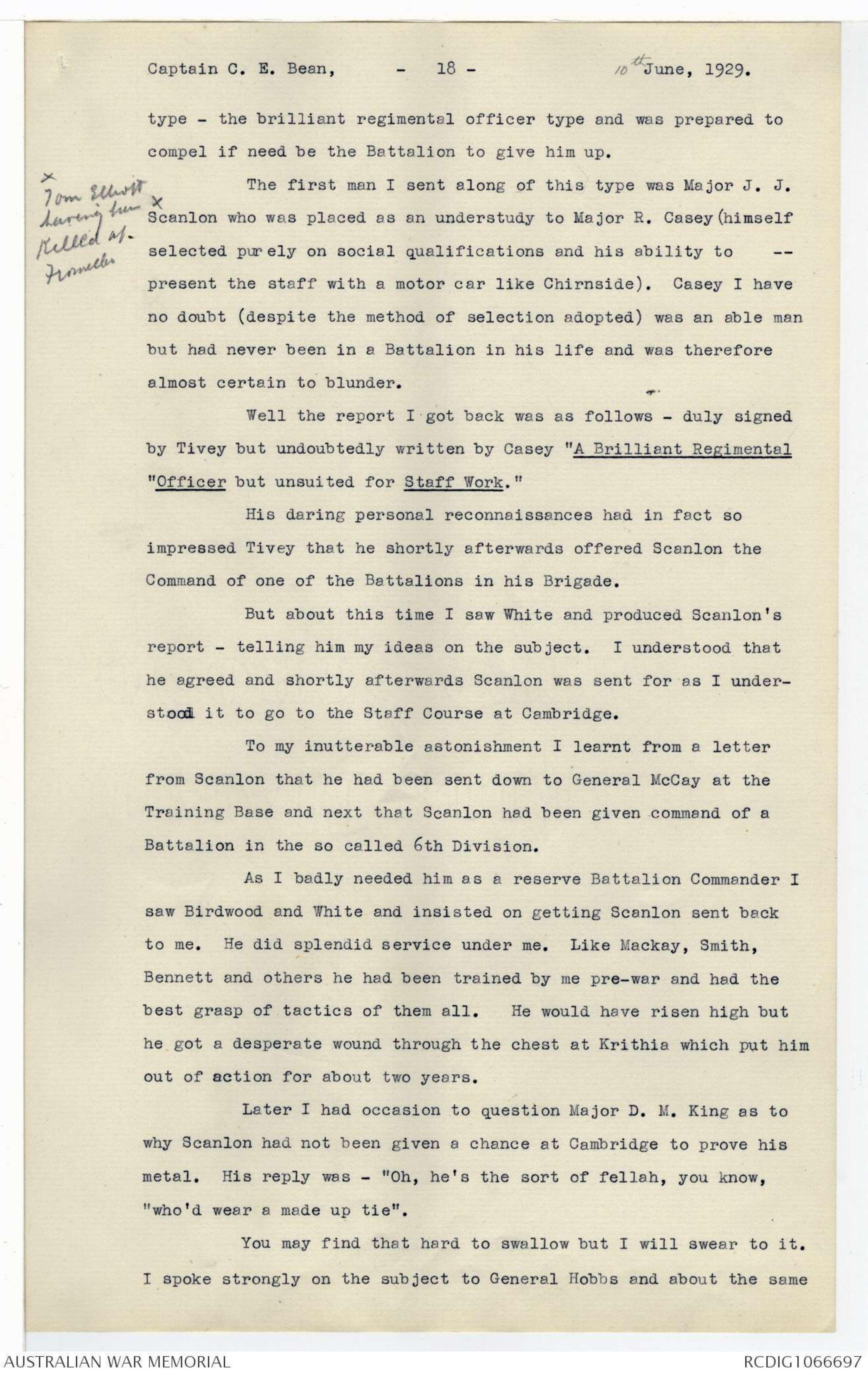
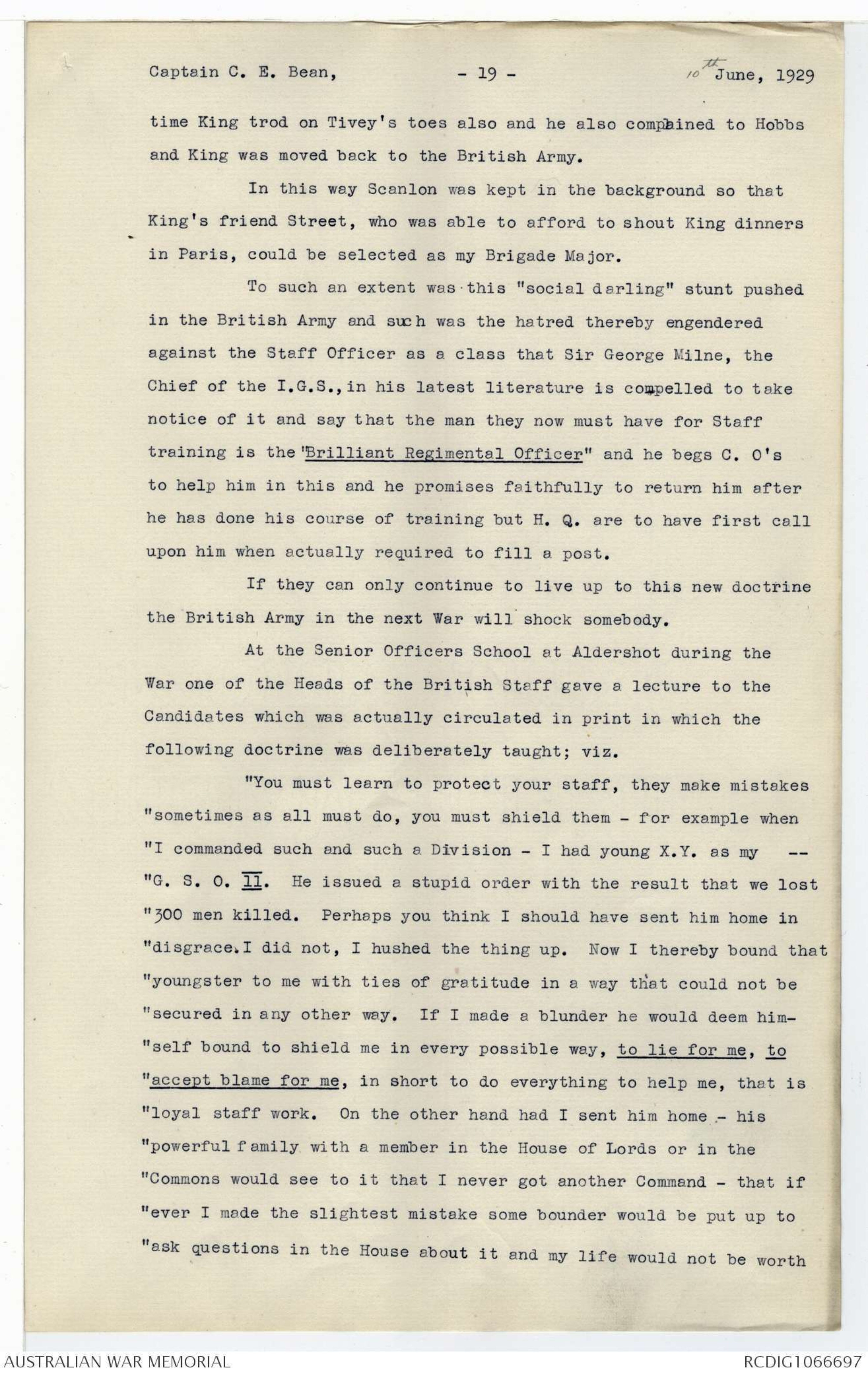
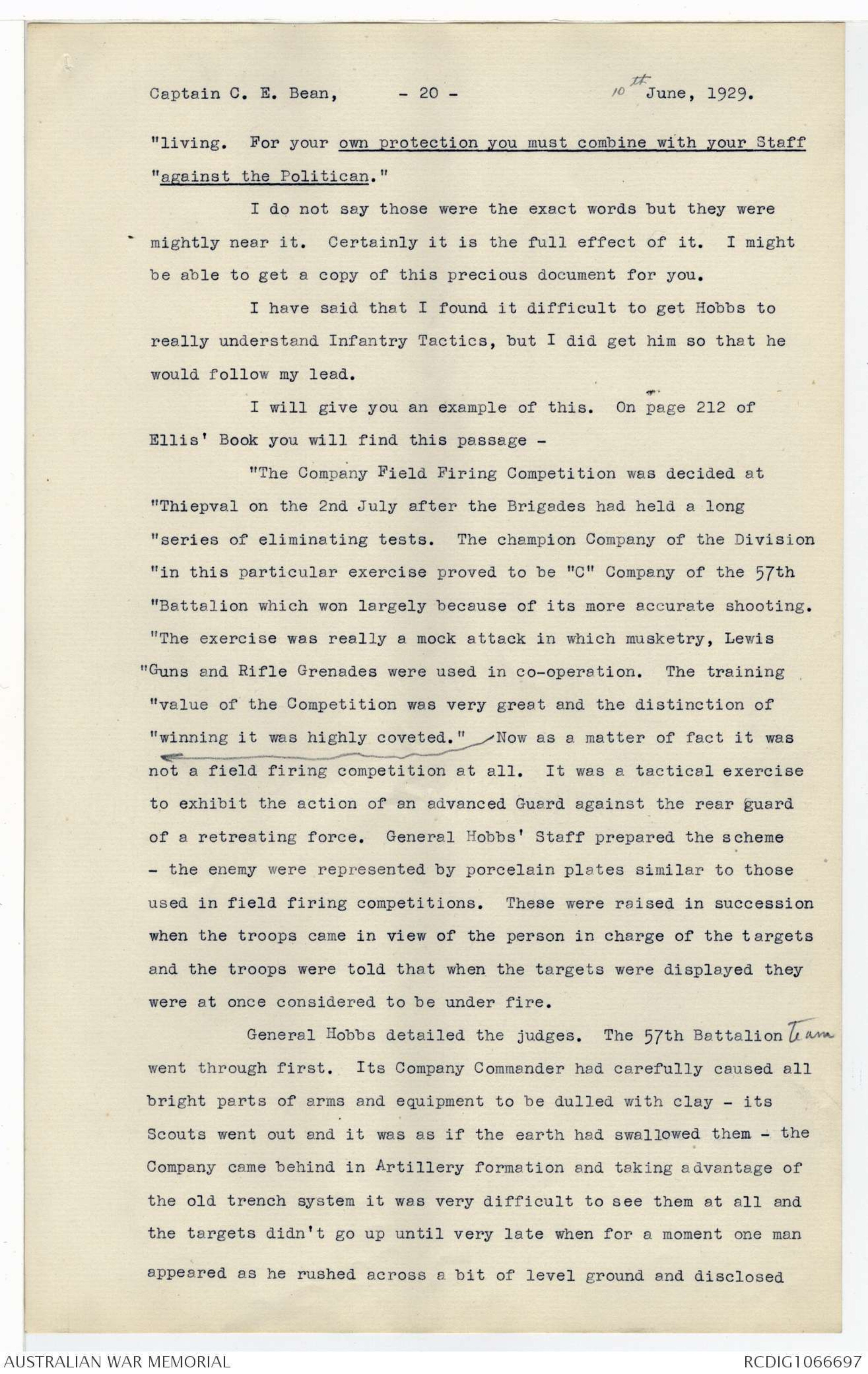
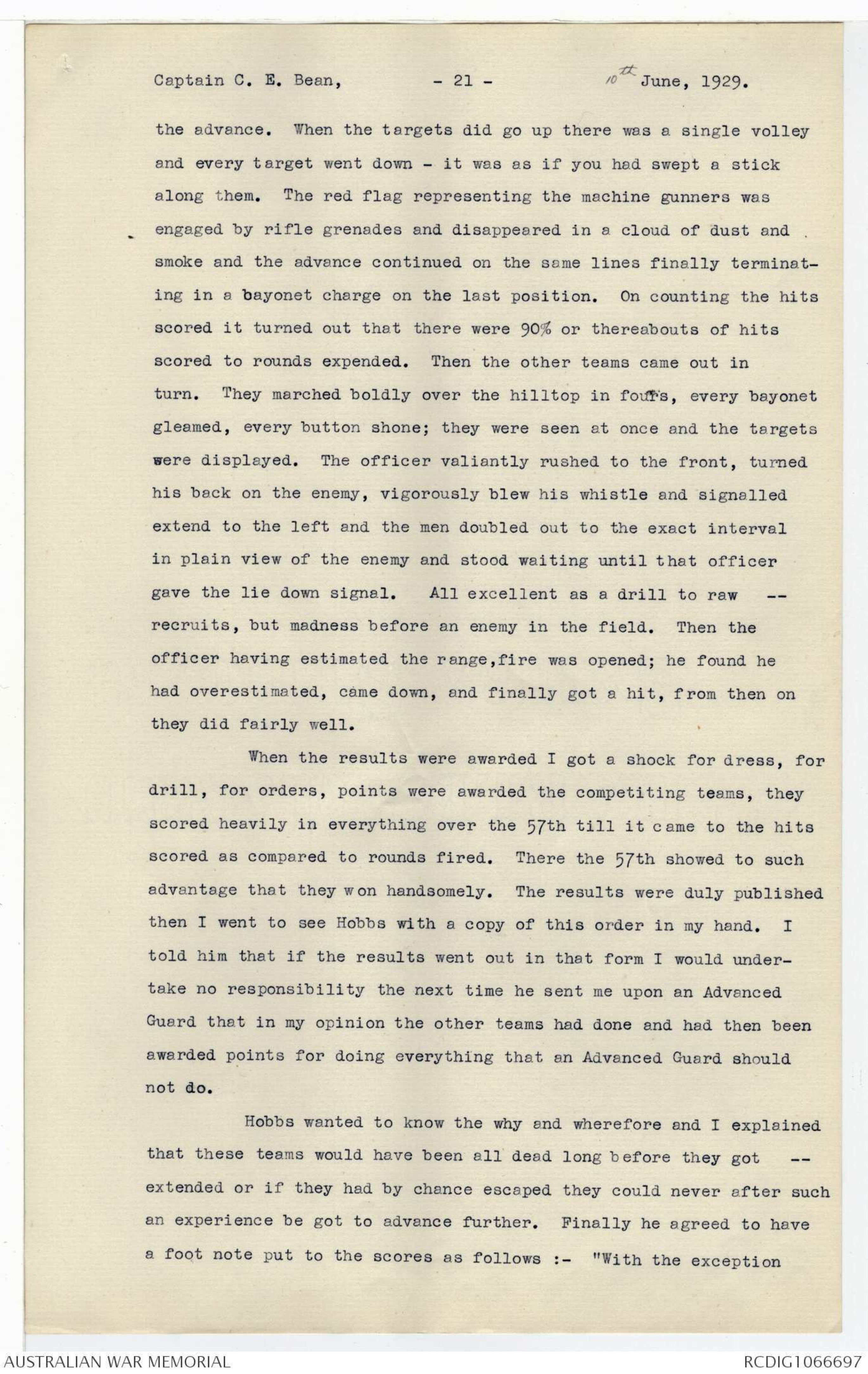
Captain C. E. Bean, - 12 - 10th June, 1929
enemy a chance - and it was more or less (as far as I can learn)
an accident not planned in connection with the other attacks at
all but merely in desperation to have another go somewhere along
the line.
Had Marlborough commanded in this War that central
point would from the beginning have been the main objective, the
focal point, and all the other attacks regulated and subordinated
to that end.
Also had the Commander in Chief been up with that
attack personally directing and inspiring it the results might
have been very different. Bourlon Wood should not have been
directly attacked it should have been enveloped as the village
of Blenheim was.
You will say it is easy to be wise after the event.
That is very true - but the point I am making is that the British
Staff seemed in some amazing fashion when confronted with trench
warfare to imagine that such a thing was unknown in history and
all the known rules had to be scrapped accordingly. Ludendorfs
attacks in 1918 followed Marlboroughs plan closely
For an example on a small scale of how a place like
Bourlon Wood might have been dealt with refer to Ellis Book Page
332 where the 15th Brigade dealt with Bayonvillers.
The 60th Battalion led there. They had orders upon
approaching Bayonvillers to split to right and left and give it a
wide berth uniting beyond it again without a pause whilst the
58th pressing close behind them were ordered to converge from
either side upon the village. Such a movement paralyses the
action of men who, if attacked frontally, would put up a desperate
resistance. They see these columns near and far passing them by
without attention, they see their hope of retreat, or of reinforcement
cut off, they realize that resistance will mean in all --
probability certain death by the bayonet, and their morale
collapses.
To quote Napoleon's dictum "The morale is to the physical
"as 3 to 1" and it is true.
When I had my orders given me to attack on that occasion
Captain C. E. Bean - 13 - 10th June, 1929.
I was left totally unfettered. My Battalions were led by Scanlon
and Denehy in Front, Watson and Layh in rear. I had trained them
all pre-war and as it were moulded their line of thought into -
mine. Scanlon who had the tactical sense best developed I gave the
most difficult task, to skirt Bayonvillers and envelope Harbonnieres.
The first called for absolute confidence in me and in the
supporting Battalions for if either failed the whole of the leading
Battalion might well be cut off and lost. But my Brigade at that
time under them were like a finely tempered flexible swordblade.
It could not fail. It was fit to rank with Craufurd's Light --
Division or Cromwell's Ironsides.
By the way I took Watson and gave him a command purely
on my pre-war knowledge of his ability. He could not come with
me when the 7th left and when he did come over no one would have
him owing to the general prejudice against senior officers who had
not seen service. I got him attached, however, to the 15th --
Brigade as a spare wheel and later got him his command.
He realized that he was on trial only at Bayonvillers and
was upon his mettle and so you find it on record that "Bayonvillers
"provided no serious obstacle" but we got a number of prisoners,
machine guns and Batteries out of it - all paralysed by a simple
enveloping movement.
The German Post War Doctrine on this subject is illuminating.
The formula of fixing combined with decisive manoevre is the
underlying idea with them; they say e.g. "Above all it is necessary
"to determine if the envelopment of the enemy is possible and at
"what point. This process employed concurrently with a vigorous
"fixing attack from the front, gives the most certain assurance of
"success. To provide against the vicissitudes of battle and to
"ensure a decisive success, the troops destined for the envelopment
"should be as strong as possible. The front is attacked with
"weaker forces. The Art of Leadership is to judge exactly what
"minimum of force will suffice for the frontal attack and how much
"must be allotted for the envelopment."
But even when a frontal attack is unavoidable the Germans
Captain C. E. Bean, -14- 10th June, 1929.
emphasize the possibility by exploiting a penetration of "attaining
"at least a local envelopment."
Even in the case of small infantry units in a large scale
attack their doctrine lays great stress in the process of fixing and
manoevre to effect a convergent attack on the opposing nests and -
-- centres of resistance.
The German doctrine throughout is emphatic on this --
subject of Military Manoevre.
"Fire from a flank multiplies the effect - of the projectiles
"and shakes the nerves of the enemy who are compelled to face and --
"defend several sides at once. This fire is particularly effective
"when it is combined with frontal fire and when executed by --
"surprise.
"The flanking action of small units and of the heavy
"infantry weapons by passing at need into a neighboring sector
"facilitates the advance. The fire and movement the frontal and
"the flank action ought to be alternate and be combined - even with
"the smallest units, outflanking manoevre should be aimed at by
"dividing them and making them converge towards the same objective".
When I passed at very great need indeed into a neighboring
sector and took Bertincourt in March 1917 I ^only got well strafed by
Birdwood and White for my pains. I took care not to offend again
at Villers-Brettoneux although having the 58th in reserve and fresh
I could easily have passed it through the 59th and closed the --
cordon - but this would have been a trespass on Glascow's ground.
[*VB.*]
Again at Polygon Wood I felt compelled to protest in my
report against Corps prescribing the formation of Battalions and
even of Companies the same for all irrespective of ground or ought
else. There was nothing of this under Monash: freedom flexibility
and confidence then prevailed. Reading Gullet's Palestine Campaign
and recognising Chauvel's mastery of tactics marred though it was
at Romana and 1st Gaza by British stupidity I realize now what a
calamity it was that Pearce and White inflicted Birdwood upon us
instead of giving the Corps Command to Chauvel or Monash.
That I myself have my own grevous limitations I am free
[*Pol
Wd.*]
Captain C. E. Bean, - 15 - 10th June, 1929.
to admit. By training in the law my mind ^has developed so that it --
instinctively looks to the past for enlightment. I am everlastingly
looking for a precedent. Had I like Sir John Monash had a -
training in Science and Engineering as well I might have done --
better.
The teaching in Science and Engineering tends to the
evolution of new ideas to meet old difficulties. Monash's contribution
to the Art of War is the use of the smoke barrage to
screen movement and the exact synchronization of effort, both due
to his engineering skill.
For myself a word will make clear to me my leader's -
intention. I am the efficient foreman - not the inventor the
designer of the new.
I have no capacity to suffer fools gladly - a blunder of
an incompetent Staff Officer which causes unnecessary casualties
or even tends to do so makes me see red.
I may envy and admire Marlborough's indefinite patience
with stupid and cowardly Dutch deputies and his matchless diplomacy
in engineering the support of vain and dull German princlings - but
remembering the fate of Aesop's frog I would no more attempt to
initate him than I would attempt to imitate a humming birdx whose
beauty and speed of flight struck me with admiration.
[* x
N.B. I
weigh
16 stones*]
In your summing up of leaders, which you should by the way
have left to the very last when you had heard all the evidence, you
remind me of the methods of one of our greatest criminal Barristers
call him Mr. X. K.C.
Mr. Justice Dixon (who has a wonderful legal brain) once
told me this story. Dixon was briefed as junior to the great man
- in a case involving their client, the accused, in gross fraud.
Leading Counsel read through his brief which naturally
put the best face of the case (but not the attached documents) and
then threw himself on his back on a couch in his Chambers and went
into a state of profound concentration and meditation.
In about an hour's time (during which Dixon was ---
laboriously wading through a mass of documentsbearing on the case)
Captain C. E. Bean, - 16 - 10th June, 1929.
Mr. X. K.C. quite suddenly sat up.
"Now, you know Dixon, he said, I can see plainly just
"what has happened here" and he proceeded to outline a case which
would demonstrate to the jury the entire innocence of their --
client.
When he finished - Dixon said, "Yes, Mr. X, but if that
"is true how do you account for the accused having written this
"letter."
Mr. X. took the letter, absorbed its contents in a single
glance, and threw himself once more upon his back "Oh dear, oh
"dear," he moaned "Whatever, did the silly man write that for".
I feel sure that some day you will experience equally
poignant regret for your judgments. We are looking toyou as the
impartial judge in his summing up not ^as the advocate.
You have I think allowed yourself to succumb entirely to
White's exceptionally charming manner which is undeniable and
proceeded to paint him entirely as he would wish to be presented
to the Jury of his countrymen. You present him as disinterested.
You do not mention that he had himself promoted to the rank of
Major General when his grade as G.S.O. 1 at Corps on all British
precedents should have been Brigadier General only and that this
automatically gave him seniority over all G. S. O's 1 of all --
British Corps and thus put him directly in the running for the
summit of his ambition the job of Chief of Staff at Army H. Q.
which fact made many a G. S. O. in the British Army fume and stamp
with rage. But that fact would discount your assurance to the
public that he was quite disinterested.
Then you quote with approval that he never sought decorations.
Once he became G. S. O. 1 of an Anzac Corps he would have
difficulty in escaping from having them thrust upon him.
As well say that a man who walked out bareheaded in a
snowstorm did not really desire to collect snow flakes in his
curls.
White was undoubtedly the great stumbling block in the
way of getting Australians on the A. I. F. Staff- Why? Not
Captain C. E. Bean, - 17 - 10th June, 1929.
because he feared they were not able but because he feared that
if this were insisted upon it would be applied reciprocally and the
British would refuse to take one Australian viz. himself on to a
British Staff - Was this a disinterested attitude?
You have also I think consciously or unconsciously --
permitted yourself to absorb without full examination his point of
view upon others.
Arising out of White's reluctance to part with the --
British Staff Officers on loan to us when he was being pressed to
do so by General Dodds was this further blunder.
When he saw that he would have to yield he called for -
learners on the A. & Q. side only. It was not made clear to us
that these were to graduate through to become Brigade Majors and
G. Staff men; perhaps he never really intended that they should
and that he could always make the excuse that they did not fit the
job. Hence on my interpretation of my instructions I selected for
recommendation not the brilliant officer but the painstaking office
man with an accountant's training and brain the man that would see
that bombs were not set up without the detonators and would not
require a return as to the number of tins of strawberry jam issued
a month ago. The other type - the Mackay's and other suitable
for "G" Staff were always about as scarce as hen's teeth and
mostly you could not get a Battalion C. O. to part with them nor
could you induce the man himself to go to a pure office job.
Apparently the same policy as White had adopted was being
followed in the British Army - i. e. let the A & Q. go to the
new men but hang on to all the G jobs for the Regular Army men
for you find Phillip Gibbs saying at page 55 "Realities of War"
"Owing largely to New Army brains the administrative side of our
"War became efficient in its method and organization, and the armies
"were worked like clockwork machines."
Later I discovered that these learners, (often enough in
other Brigades, selected because of their social position or --
charming table manners), were on account of Dodd's pressure to
come back to us as Brigade Majors and I put forward quite another
Captain C. E. Bean, - 18 - 10th June, 1929 .
type - the brilliant regimental officer type and was prepared to
compel if need be the Battalion to give him up.
[* x Tom Elliott
having been
Killed at
Fromelles *]
The first man I sent along of this type was Major J. J.
x Scanlon who was placed as an understudy to Major R. Casey (himself
selected purely on social qualifications and his ability to --
present the staff with a motor car like Chirnside). Casey I have
no doubt (despite the method of selection adopted) was an able man
but had never been in a Battalion in his life and was therefore
almost certain to blunder.
Well the report I got back was as follows - duly signed
by Tivey but undoubtedly written by Casey "A Brilliant Regimental
"Officer but unsuited for Staff Work."
His daring personal reconnaissances had in fact so
impressed Tivey that he shortly afterwards offered Scanlon the
Command of one of the Battalions in his Brigade.
But about this time I saw White and produced Scanlon's
report - telling him my ideas on the subject. I understood that
he agreed and shortly afterwards Scanlon was sent for as I understood
it to go to the Staff Course at Cambridge.
To my inutterable astonishment I learnt from a letter
from Scanlon that he had been sent down to General McCay at the
Training Base and next that Scanlon had been given command of a
Battalion in the so called 6th Division.
As I badly needed him as a reserve Battalion Commander I
saw Birdwood and White and insisted on getting Scanlon sent back
to me. He did splendid service under me. Like Mackay, Smith,
Bennett and others he had been trained by me pre-war and had the
best grasp of tactics of them all. He would have risen high but
he got a desperate wound through the chest at Krithia which put him
out of action for about two years.
Later I had occasion to question Major D. M. King as to
why Scanlon had not been given a chance at Cambridge to prove his
metal. His reply was - "Oh, he's the sort of fellah, you know,
"who'd wear a made up tie".
You may find that hard to swallow but I will swear to it.
I spoke strongly on the subject to General Hobbs and about the same
Captain C. E. Bean, - 19 - 10th June 1929
time King trod on Tivey's toes also and he also complained to Hobbs
and King was moved back to the British Army.
In this way Scanlon was kept in the background so that
King's friend Street, who was able to afford to shout King dinners
in Paris, could be selected as my Brigade Major.
To such an extent was this "social darling" stunt pushed
in the British Army and such was the hatred thereby engendered
against the Staff Officer as a class that Sir George Milne, the
Chief of the I. G. S., in his latest literature is compelled to take
notice of it and say that the man they now must have for Staff
training is the "Brilliant Regimental Officer" and he begs C. O's
to help him in this and he promises faithfully to return him after
he has done his course of training but H. Q. are to have first call
upon him when actually required to fill a post.
If they can only continue to live up to this new doctrine
the British Army in the next War will shock somebody.
At the Senior Officers School at Aldershot during the
War one of the Heads of the British Staff gave a lecture to the
Candidates which was actually circulated in print in which the
following doctrine was deliberately taught; viz.
"You must learn to protect your staff, they make mistakes
"sometimes as all must do, you must shield them - for example when
"I commanded such and such a Division - I had young X. Y. as my --
"G. S. O. 11. He issued a stupid order with the result that we lost
"300 men killed. Perhaps you think I should have sent him home in
"disgrace. I did not, I hushed the thing up. Now I thereby bound that
"youngster to me with ties of gratitude in a way that could not be
"secured in any other way. If I made a blunder he would deem himself
"bound to shield me in every possible way, to lie for me, to
"accept blame for me, in short to do everything to help me, that is
"loyal staff work. On the other hand had I sent him home - his
"powerful family with a member in the House of Lords or in the
"Commons would see to it that I never got another Command - that if
"ever I made the slightest mistake some bounder would be put up to
"ask questions in the House about it and my life would not be worth
Captain C. E. Bean, - 20 - 10 June, 1929.
"living. For your own protection you must combine with your Staff
"against the Politican."
I do not say those were the exact words but they were
mightly near it. Certainly it is the full effect of it. I might
be able to get a copy of this precious document for you.
I have said that I found it difficult to get Hobbs to
really understand Infantry Tactics, but I did get him so that he
would follow my lead.
I will give you an example of this. On page 212 of
Ellis' Book you will find this passage -
"The Company Field Firing Competition was decided at
"Thiepval on the 2nd July after the Brigades had held a long
"series of eliminating tests. The champion Company of the Division
"in this particular exercise proved to be "C" Company of the 57th
"Battalion which won largely because of its more accurate shooting.
"The exercise was really a mock attack in which musketry, Lewis
"Guns and Rifle Grenades were used in co-operation. The training
"value of the Competition was very great and the distinction of
"winning it was highly coveted."
Now as a matter of fact it was
not a field firing competition at all. It was a tactical exercise
to exhibit the action of an advanced Guard against the rear guard
of a retreating force. General Hobbs' Staff prepared the scheme
- the enemy were represented by porcelain plates similar to those
used in field firing competitions. These were raised in succession
when the troops came in view of the person in charge of the targets
and the troops were told that when the targets were displayed they
were at once considered to be under fire.
General Hobbs detailed the judges. The 57th Battalion Team
went through first. Its Company Commander had carefully caused all
bright parts of arms and equipment to be dulled with clay - its
Scouts went out and it was as if the earth had swallowed them - the
Company came behind in Artillery formation and taking advantage of
the old trench system it was very difficult to see them at all and
the targets didn't go up until very late when for a moment one man
appeared as he rushed across a bit of level ground and disclosed
Captain C. E. Bean, - 21 - 10th June 1929
the advance. When the targets did go up there was a single volley
and every target went down - it was as if you had swept a stick
along them. The red flag representing the machine gunners was
engaged by rifle grenades and disappeared in a cloud of dust and
smoke and the advance continued on the same lines finally terminating
in a bayonet charge on the last position. On counting the hits
scored it turned out that there were 90% or thereabouts of hits
scored to rounds expended. Then the other teams came out in
turn. They marched boldly over the hilltop in fours, every bayonet
gleamed, every button shone; they were seen at once and the targets
were displayed. The officer valiantly rushed to the front, turned
his back on the enemy, vigorously blew his whistle and signalled
extend to the left and the men doubled out to the exact interval
in plain view of the enemy and stood waiting until that officer
gave the lie down signal. All excellent as a drill to raw
recruits, but madness before an enemy in the field. Then the
officer having estimated the range,fire was opened; he found he
had overestimated, came down, and finally got a hit, from then on
they did fairly well.
When the results were awarded I got a shock for dress, for
drill, for orders, points were awarded the competiting teams, they
scored heavily in everything over the 57th till it came to the hits
scored as compared to rounds fired. There the 57th showed to such
advantage that they won handsomely. The results were duly published
then I went to see Hobbs with a copy of this order in my hand. I
told him that if the results went out in that form I would undertake
no responsibility the next time he sent me upon an Advanced
Guard that in my opinion the other teams had done and had then been
awarded points for doing everything that an Advanced Guard should
not do.
Hobbs wanted to know the why and where fore and I explained
that these teams would have been all dead long before they got
extended or if they had by chance escaped they could never after such
an experience be got to advance further. Finally he agreed to have
a foot note put to the scores as follows :- "With the exception
 Sam scott
Sam scottThis transcription item is now locked to you for editing. To release the lock either Save your changes or Cancel.
This lock will be automatically released after 60 minutes of inactivity.